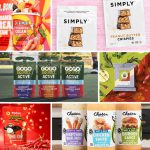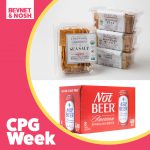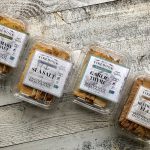The Checkout: Accelerator Famous for Reddit & Airbnb Focuses on Clean Meat
Welcome to The Checkout: an express lane for weekly news you need to know, always 10 items or less.
Every business has its own playbook. As every successful team knows, there is a time to play it safe and there’s also a time to throw out the book all together. This week, many food industry players chose the latter.
From an accelerator supporting a startup that fits its new priorities, to brands differentiating their product portfolios beyond their legacy offerings, here are some of this week’s top stories that you should know.
Sustainable Food Was Hot Topic During Y Combinator Demo Day
Sustainable food was a topic of conversation this week at the demo day for Y Combinator (YC) — the accelerator that helped launch Airbnb, Reddit and DropBox. It’s all part of a new focus for YC, which only just added “cellular agriculture and clean meat” to its list of funding priorities.
“We actually believe that clean meat could replace nearly all animal meat at some point,” Gustaf Alstromer, a partner at YC, told Fast Company. “YC got interested in it because of the innovation in this industry. We think that if it works this will revolutionize the entire meat industry and we think that it will probably be entrepreneurs and startups that build the companies that produce that meat.”
At the Demo Day presentations, a variety of companies with this mission were present. Seattle Food Tech, the maker of plant-based chicken nuggets;Spero Foods, the brand behind plant-based cheese and eggs; Cytera CellWorks, a tech firm that helps labs make cell cultures for clean meat; and Mylk Guys, a vegan grocery delivery startup, all highlighted their progress.
But perhaps most notable was The Good Food Institute, a different choice for YC as it typically does not work with nonprofits. Good Food Institute was founded over two years ago with the mission of advocating for the study and use of clean meat and has launched three startups itself. Because of its 501c3 status, the $120,000 funding that accompanies being part of YC will serve as a donation to the institute.
Arctic Zero Launches Plant-Based Line
Low calorie, lactose-free ice cream maker Arctic Zero has now added a new claim to its attributes: plant-based. The brand announced this week that is has launched a non-dairy line of frozen desserts made with faba protein.
Arctic Zero Non-Dairy will debut with nine flavors at Publix stores in Florida in late August, according to the company. A nationwide expansion is expected by the fall.
“We created the original Arctic Zero so that people with restrictions like lactose-intolerance, low-sugar and low-calorie diets could enjoy a delicious frozen dessert without junk ingredients like erythritol and other sugar alcohols,” Amit Pandhi said via a release. “We’re confident our long-time fans also are going to love the change.”
As the pint spice gets more crowded, the plant-based innovation is a way for Arctic Zero to differentiate itself with a hot trend. According to a Nielsen global survey, 39 percent of Americans are trying to incorporate more plant-based foods into their diets, and that preference extends to consumers who also eat animal-based products.
The portfolio addition is not the company’s first move to attract a wider audience. Earlier this year, Arctic Zero introduced Arctic Zero Light Ice Cream, a low-calorie ice cream made with milk and cream and sweetened with organic cane sugar.
Chipotle to Launch Food Tech Accelerator
After facing many of its own food safety issues, Chipotle Mexican Grill is looking to startups to help create technology to improve the food industry.
The Mexican fast-casual chain announced this week that its Chipotle Cultivate Foundation will sponsor the first Chipotle Aluminaries Project, an accelerator program designed to help food tech companies take their businesses to the next level, in partnership with Denver-based non-profit Uncharted. Chipotle is contributing $200,000 to Uncharted to support the program.
“Chipotle has been committed to the future of food with integrity since opening our first restaurant 25 years ago,” Brian Niccol, Chipotle CEO, said via a release. “We’re looking to advance the work of the next generation of entrepreneurs who are disrupting the food landscape.”
The seven month program will consist of mentorship and coaching, as well as an industry boot camp, according to the company.
The sudden interest in fostering food tech startups comes at a time when Chipotle itself has struggled with improving its own food safety stop gates across its chains nationwide. The company has been the root of numerous food safety crises that have resulted in hundreds of customers getting sick after eating at the chain. Food safety and technology has also been a major topic across the CPG industry.
Chipotle is not the only food leader looking to back food tech innovation. In June, Chobani announced that it will allow food tech startups to apply for a residency that will run parallel to its traditional incubator.
Ben & Jerry’s Tries Snacking, Sans Ice Cream
Ben & Jerry’s is now selling the same dough found in its fan favorite pints such as Peanut Buttah Cookie Core, the Tonight Dough, Half-Baked, and Chocolate Chip Cookie Dough, sans the ice cream.
The company sent packages of the half pound bags of edible frozen dough to food influencers, who announced the news on their social media feeds earlier this week. For now, the product will only be sold in some of the company’s Vermont scoop shops before potentially expanding retail distribution, according to social media posts.
This is another step into the snacking arena for Ben & Jerry’s. The company most recently played with more snackable formats with the launch of pint slices last summer. However, while the edible cookie dough bites will live in the freezer aisle, this is the first product from the company to be made without ice cream of any kind.
Boxed Raises $111 Million
Groceries aren’t the only thing Boxed gets in bulk. The NYC-based e-commerce company that delivers bulk-sized groceries announced on Tuesday that it raised $111 million. This latest funding brings Boxed’s total raised funds to $243 million.
The Series D round was led by Aeon Co., the largest retailer in Japan, with participation from the Alpha Square Group, CDIB Capital, and consumer technology investor Gabriel Naouri, as well as other previous investors. With the new funding, the company said it plans to “ramp up automation of facilities with hardware developed by Boxed’s in-house robotics team.”
The company’s announcement does not detail any plans of a Japan expansion, but the two companies did note that they will start with a “knowledge share” in synergistic areas including logistics, robotics and AI-driven data usage and digital strategy.
Boxed, as described by the company’s CMO Jackson Jeyanayagam on stage at eTail East in Boston, is similar to “if Amazon and Costco had a crazy drunk wild night in Jersey and had a kid.” The company offers bulk wholesale via e-commerce, and it’s delivered to a customer’s door within two days. To achieve this, Boxed writes its own software, runs its own fulfillment centers and builds its own automation robotics in-house, according to the company. With its new investors the New York Times reported Boxed is valued at $600 million.
General Mills Settles Suit Over “Natural,” Hit With Another for Glyphosates
After a lengthy legal battle, General Mills will officially be removing its “all natural” claim from the front of its Nature Valley granola bars packaging.
In 2016, three nonprofit groups issued a complaint against the CPG giant for misleading consumers with a “Made with 100% Natural Whole Grain Oats” claim on the front of its Nature Valley packaging. The groups alleged that the oats actually contain the chemical glyphosate, a potent biocide and human endocrine disruptor, with detrimental health effects that are still becoming known.
The decision to settle may be a move to focus on a potentially more costly lawsuit. Six days after Monsanto was ordered to pay $289 million in damages to a man who alleged its glyphosate-based herbicide caused his cancer, General Mills was hit with a class action lawsuit that claims that the company failed to disclose the presence of glyphosates in its Cheerios cereal products.














